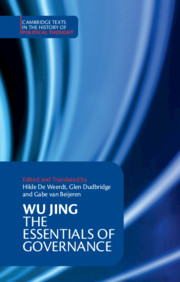
-
Select format
-
- Publisher:
- Cambridge University Press
- Publication date:
- January 2021
- January 2021
- ISBN:
- 9781108923118
- 9781108831048
- 9781108926287
- Dimensions:
- (216 x 138 mm)
- Weight & Pages:
- 0.63kg, 442 Pages
- Dimensions:
- (216 x 138 mm)
- Weight & Pages:
- 0.53kg, 442 Pages
You may already have access via personal or institutional login
Book description
In the eighth century, Wu Jing selected exchanges between Emperor Taizong and his ministers that he deemed key to good governance. This collection of dialogues has been used for the education of emperors, political elites and general readers ever since, and is a standard reference work in East Asian political thought. Consisting of ten volumes, subdivided into forty topics, The Essentials of Governance addresses core themes of Chinese thinking about the politics of power, from the body politic, presenting and receiving criticism, recruitment, the education of the imperial clan, political virtues and vices, to cultural policy, agriculture, law, taxation, border policy, and how to avoid disaster and dynastic fall. Presented with introductory commentary that offers insights into its historical context and global reception, this accessible and reliable translation brings together ten scholars of Chinese intellectual history to offer a nuanced edition that preserves the organisation, tone and flow of the original.
Contents
Metrics
Altmetric attention score
Full text views
Full text views help Loading metrics...
Loading metrics...
* Views captured on Cambridge Core between #date#. This data will be updated every 24 hours.
Usage data cannot currently be displayed.
Accessibility standard: Unknown
Why this information is here
This section outlines the accessibility features of this content - including support for screen readers, full keyboard navigation and high-contrast display options. This may not be relevant for you.
Accessibility Information
Accessibility compliance for the PDF of this book is currently unknown and may be updated in the future.


